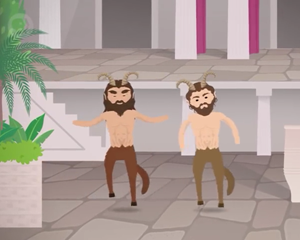(单词翻译:单击)
The theater of dionysus was an outdoor amphitheater built into the Athenian hillside.
狄俄尼索斯剧场是建在雅典半山腰上的圆形露天剧场。
You can still visit the ruins today. Its first incarnation might not have had seats.
现在剧场的遗址仍然可供参观。最初的狄俄尼索斯剧场是没有座位的。
But eventually, they were added wood first and then stone.
但后来他们加了木头座位,之后又加了石头座位。
The seated section was known as the Theatron or seeing place.
座位区被称为“观众席”或者“观看区”。
The chorus performed on a flat part called the Orchestra, and in the center of the Orchestra was the Thymele or Altar.
合唱团在一处叫作“Orchestra(乐队演奏处)”的一块平坦的区域里表演,“Orchestra”的中心是“剧院台前的护坦”或者“圣坛”。
At some point, a dressing hut called a Skene was also built, so that actors could change masks.
后来的某个时期,他们又建造了一处用来化妆的小屋,被称为“Skene”,这样一来演员们就有地方换面具了。
With only two or three actors playing every role, you got to change masks pretty often.
因为全场的角色都只是由两到三个演员来饰演,所以演员们不得不频繁地换面具。
There were several ways on and off stage known as Paradoi, including two side entrances, so big Choruses could march on and off when needed.
登台和退台的出入口有好几个,被称为“Paradoi”,其中包括两舞台两边的出口,这样的话大合唱团便可以在他们需要的情况下随时出入。
There was also a place on top of the Skene, where an actor playing a God could appear and descend in a cart, which was called the God in the machine or The Deus Ex Machina, maybe you're wondering why might a playwright need a god to descend from the heavens.
在“Skene”的顶部还有一个地方,这个地方是演员们扮演上帝的时候坐着马车从天而降用的,这个地方被称为“机器之神”或者“机械姬”。或许此刻你正在脑补剧作家编写“上帝从天而降”这么一个桥段的用意。
Well sometimes, you write your way into a situation and you can't write yourself out.
好吧。有的时候剧作家会在剧情里编写一些坑,但是自己却填不了,
So it's pretty helpful to have Zeus or Apollo come on down and make everything right.
这个时候最好的办法就是让宙斯或者阿波罗(太阳神)过来填坑。
All of the actors wore masks made of linen with hair attached.
所有的演员都戴着附着头发的亚麻制面具。
So they probably looked pretty frightening, especially, the one of Oedipus with blood all around the eyes.
所以他们看起来可能会很吓人,最吓人的就是那个眼睛周围布满血液的俄狄浦斯。
Tragic actors also wore robes and platform shoes called Cothurni.
悲剧演员们也都披着长袍,穿着一种叫做“Cothurni”的厚底鞋。
So just imagine a lot of big sweeping gestures, and trying not to trip.
所以,可以脑补一下演员们做着一些大幅度动作,然后又要尽量让自己避免滑倒的场景。
Thanks thought-bubble. Yeah.
谢谢思想泡泡。嗯。
Thing is no less terrifying from the inside either.
在里面看也是同样可怕。

So during the dithyramb contest, after each playwright presented his Tetralogy, a group of 10 randomly chosen citizens would select the winner, who was honored with an ivy wreath, sacrificial animals, and a big banquet.
所以,在酒神颂比赛期间,每位剧作家表演完自己的四联剧之后便会由十名随机挑选出来的市民选出获胜者,获胜者将得到常青藤花环、参加动物祭祀和盛大宴会的奖励。
The Athenians took this contest very seriously. And if any funny business was suspected, there were lawsuits.
雅典人非常重视这个比赛,一旦被怀疑进行非法交易便会被控告。
Tragedy hits golden age in the 15th century Athens: first, with the works of Aeschylus, then Sophocles and Euripides.
悲剧在15世纪的雅典迎来了其黄金时代的到来:起初火起来的是埃斯库罗斯的作品,然后是索福克勒斯和欧里庇得斯的作品。
Because papyrus disintegrates and invading hordes kept burning libraries.
因为纸莎草容易分解,加上有其它的部落不断入侵并烧毁图书馆,
We don't have the plays that they wrote.
所以他们的剧作没有被保存下来。
Aeschylus wrote as many as 90 plays, but we have only seven.
埃斯库罗斯的戏剧作品多达90部,但保留下来的只有7部。
Sophocles wrote 120, but we have only seven.
索福克勒斯写了120部戏剧,被保留下来的也只有7部。
Of the 92 Euripides wrote, more than seven, at least this time, we have 19.
在欧里庇得斯创作的92部剧作里,这次至少超过了7部,他的作品被保留下来的有19本。
Those thirty odd plays have had a huge impact though, they're still very widely read.
这三十多部戏剧影响甚大,至今阅读量都很高。
They matter to us now because they provide a template for most contemporary drama.
这些戏剧对现在的我们很重要,因为它们为大部分的当代戏剧提供了模板。
But let's look for a second at how they mattered then.
我们来看看这些戏剧在那个年代的重要程度吧。
It's a huge deal to have 14,000 of your most prominent citizens hang out on a hillside, watching plays when they could be doing their civic duty.
1.4万名最出众的公民在山坡上闲逛并观看戏剧是他们本该履行的公民义务,是一件大事。
But as it turns out they were doing their civic duty.
事实证明,他们确实是在履行自己的公民义务。
The leading citizens of Athens decided that it was important to get together and see plays that actively questioned the values and structures of the state.
雅典的上层公民认为大家聚在一起观看戏剧很重要,因为正是这些戏剧对国家的价值和构造积极地进行了质疑。
These plays are exploring what it means to be a part of a family and a nation and what to do when divided loyalties creates conflict.
这些戏剧探讨了作为家庭和国家的一分子意味着什么,面对由于不忠诚导致的冲突时该怎么办。
They can teach you to be a better person and a better citizen by encouraging you to ask through the dramatic action what a good person is and what a good citizen does.
戏剧鼓励观众们透过戏剧化的情节来扪心自问:好人是怎样的?怎样做一名好公民?戏剧可以教你怎样去做一个更好的人、更好的公民。
Tragedy does something else too, at least according to Aristotle?
至少在亚里士多德看来悲剧确实有其它的作用。
He wrote the poetics, one of the world's first works of literary criticism.
他的作品《诗学》是世界上最早的文学批评著作之一。
And he had a theory about what made tragedy so important, and his theory was about Catharsis, which literally means Purgation.
他有一个讲述“悲剧如此重要的原因”的理论,他的理论有关“Catharsis”,字面意思是“净化”。
Aristotle writes that tragedy through pity and fear affects the proper purgation of these emotions.
亚里士多德写道:悲剧通过怜悯和恐惧来影响这些情感的适度净化。
Now, a lot of scholars have spilled a lot of ink trying to explain what this means.
当今的很多学者费了很大的功夫想弄明白这句话的意思。
So, it's unlikely we are gonna get to the bottom of it right here and now, but let me quickly offer one interpretation of catharsis.
所以,我们此时此地也不太可能迅速搞明白它的意思,但是,我可以迅速地给大家讲一下关于“catharsis”的解释。
Let's try out the idea that tragedy by exciting the emotions of pity and fear becomes an outlet for those emotions.
我们来试着这样想一下:悲剧通过激发怜悯和恐惧的情绪使自己成为这些情绪的发泄渠道。
If we believe that pity and fear, maybe aren't that helpful in a democracy, then we can argue that it's better to feel these things at a play, have an emotional catharsis, and then just get that stuff out of our systems and go back to being productive members of society.
如果我们相信怜悯和恐惧在一个民主国家或许并不是那么有用的话,那我们可以理解成:在一场戏剧中我们能更好地去体会这些情感,寻找到一个“情感的发泄口”,然后我们就能将这些情绪通通消化掉、继续做回社会里年轻上进的好青年。
Like imagine how productive all those people who've seen Les Mis hundreds of times must be, or people who've seen thousands of episodes of General Hospital for that matter.
想象一下那些看《悲惨世界》看了几百遍的人,还有那些看了几千集《综合医院》的人,想象一下他们得有多上进。
Next time, we're gonna look more closely at Aristotle's theories and use them to discuss Aeschylus's Oresteia, the only complete tragic trilogy we have, and then finally on to the Satyrs and their phalluses.
下一集,我们将进一步研究亚里士多德的理论,并用这个理论来讨论埃斯库罗斯的作品《奥瑞斯提亚》,它是被保留下来的唯一的一部完整的三部曲,之后我们会讲到“Satyrs(希腊神话中的半人半兽)”以及他们的~“棒子”。
Thanks for watching and Curtain.
谢谢观看,谢幕!
Crash Course Theatre is produced in association with PBS Digital Studios.
戏剧速成小课堂与PBS数字工作室联合制作。
Crash course Theatre is filmed in the chad and stacey emigholz studio in indianapolis, indiana.
戏剧速成小课堂的拍摄地为印第安纳州(美国中部的州)的印第安纳波利斯(美国印第安纳州首府)的乍得以及希腊爱米高兹工作室。
And is produced with the help of all of these very nice people.
在这些美好之人的帮助下制作完成。
Our animation team is Thought Cafe.
我们的动画团队是“思想咖啡”。
Crash course exists thanks to the generous support of our patrons at Patreon.
速成课堂要感谢“众筹网站”赞助人的慷慨支持。
Patreon is a voluntary subscription service, where you can support the content you love through a monthly donation and help keep Crash Course free for everyone, forever.
“众筹网站”是一项自愿订阅服务,你可以通过每月的捐款来支持你喜欢的内容并帮助所有人都能永远免费听取速成课堂的内容。
Thanks for watching.
谢谢观看。


